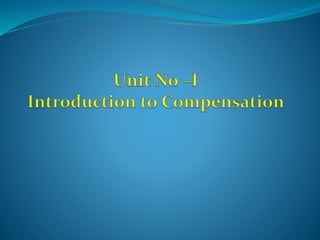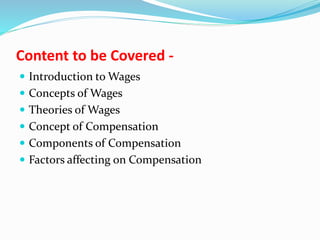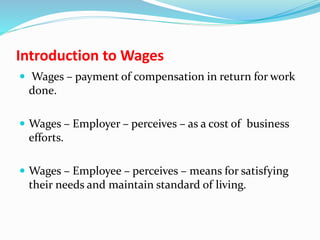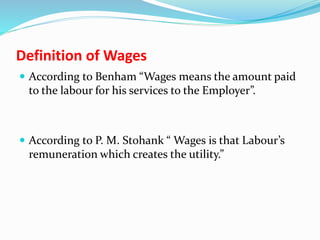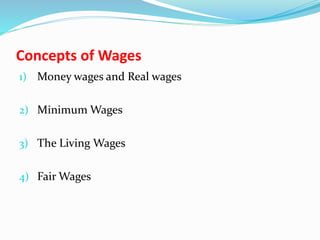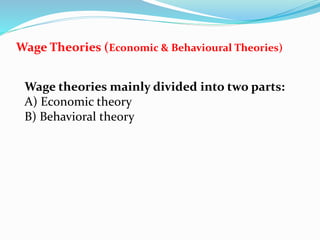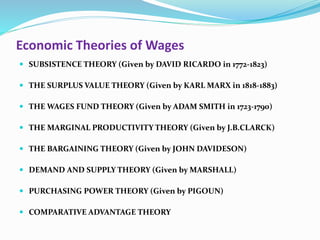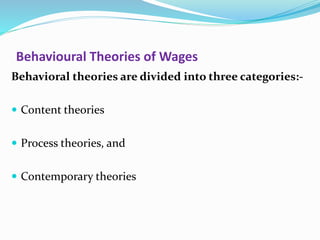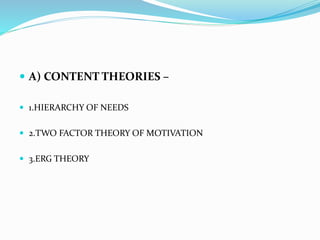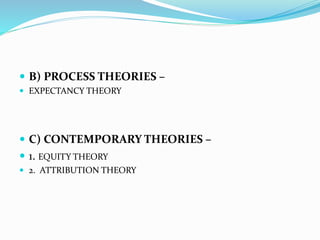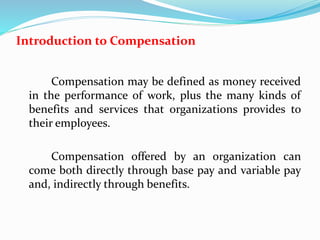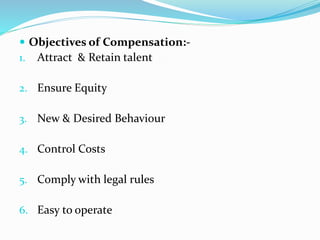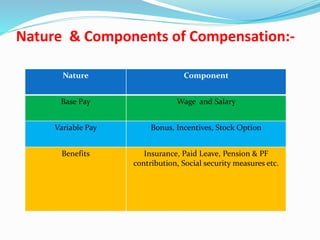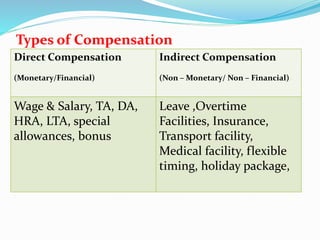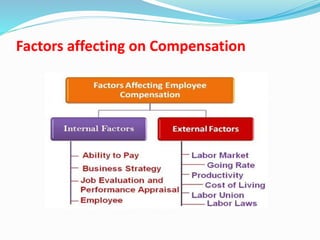Compensation Management
- 2. Content to be Covered - ’éŚ Introduction to Wages ’éŚ Concepts of Wages ’éŚ Theories of Wages ’éŚ Concept of Compensation ’éŚ Components of Compensation ’éŚ Factors affecting on Compensation
- 3. Introduction to Wages ’éŚ Wages ŌĆō payment of compensation in return for work done. ’éŚ Wages ŌĆō Employer ŌĆō perceives ŌĆō as a cost of business efforts. ’éŚ Wages ŌĆō Employee ŌĆō perceives ŌĆō means for satisfying their needs and maintain standard of living.
- 4. Definition of Wages ’éŚ According to Benham ŌĆ£Wages means the amount paid to the labour for his services to the EmployerŌĆØ. ’éŚ According to P. M. Stohank ŌĆ£ Wages is that LabourŌĆÖs remuneration which creates the utility.ŌĆØ
- 5. Concepts of Wages 1) Money wages and Real wages 2) Minimum Wages 3) The Living Wages 4) Fair Wages
- 6. Wage Theories (Economic & Behavioural Theories) Wage theories mainly divided into two parts: A) Economic theory B) Behavioral theory
- 7. Economic Theories of Wages ’éŚ SUBSISTENCE THEORY (Given by DAVID RICARDO in 1772-1823) ’éŚ THE SURPLUS VALUE THEORY (Given by KARL MARX in 1818-1883) ’éŚ THE WAGES FUND THEORY (Given by ADAM SMITH in 1723-1790) ’éŚ THE MARGINAL PRODUCTIVITY THEORY (Given by J.B.CLARCK) ’éŚ THE BARGAINING THEORY (Given by JOHN DAVIDESON) ’éŚ DEMAND AND SUPPLY THEORY (Given by MARSHALL) ’éŚ PURCHASING POWER THEORY (Given by PIGOUN) ’éŚ COMPARATIVE ADVANTAGE THEORY
- 8. Behavioural Theories of Wages Behavioral theories are divided into three categories:- ’éŚ Content theories ’éŚ Process theories, and ’éŚ Contemporary theories
- 9. ’éŚ A) CONTENT THEORIES ŌĆō ’éŚ 1.HIERARCHY OF NEEDS ’éŚ 2.TWO FACTOR THEORY OF MOTIVATION ’éŚ 3.ERG THEORY
- 10. ’éŚ B) PROCESS THEORIES ŌĆō ’éŚ EXPECTANCY THEORY ’éŚ C) CONTEMPORARY THEORIES ŌĆō ’éŚ 1. EQUITY THEORY ’éŚ 2. ATTRIBUTION THEORY
- 11. Introduction to Compensation Compensation may be defined as money received in the performance of work, plus the many kinds of benefits and services that organizations provides to their employees. Compensation offered by an organization can come both directly through base pay and variable pay and, indirectly through benefits.
- 12. ’éŚ Objectives of Compensation:- 1. Attract & Retain talent 2. Ensure Equity 3. New & Desired Behaviour 4. Control Costs 5. Comply with legal rules 6. Easy to operate
- 13. Nature & Components of Compensation:- Nature Component Base Pay Wage and Salary Variable Pay Bonus, Incentives, Stock Option Benefits Insurance, Paid Leave, Pension & PF contribution, Social security measures etc.
- 14. Types of Compensation Direct Compensation (Monetary/Financial) Indirect Compensation (Non ŌĆō Monetary/ Non ŌĆō Financial) Wage & Salary, TA, DA, HRA, LTA, special allowances, bonus Leave ,Overtime Facilities, Insurance, Transport facility, Medical facility, flexible timing, holiday package,
- 15. Factors affecting on Compensation
- 16. Reference Books 1) Personnel Management ŌĆō Mamoria & Gankar 2) Modern HRM ŌĆō Balyan & Balyan 3) Human Resource Management ŌĆō K. Aswathappa
